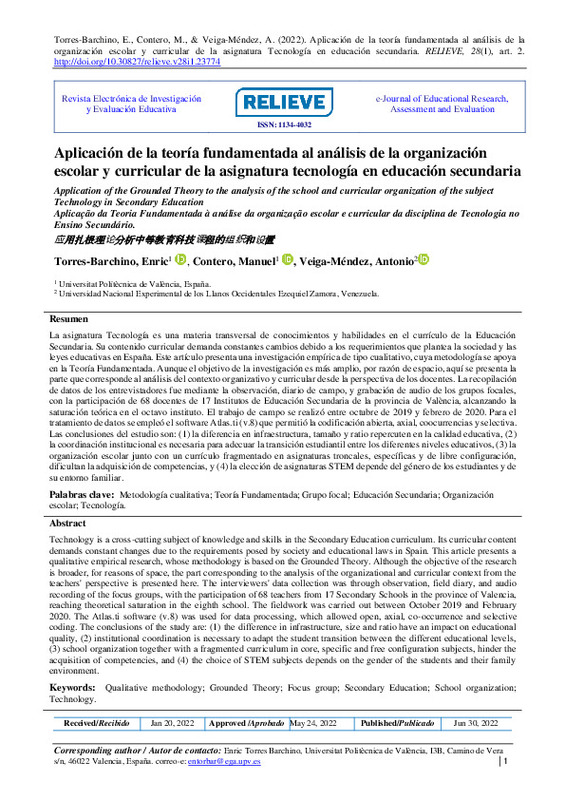|
Resumen:
|
[EN] Technology is a cross-cutting subject of knowledge and skills in the Secondary Education curriculum. Its curricular content
demands constant changes due to the requirements posed by society and educational laws in ...[+]
[EN] Technology is a cross-cutting subject of knowledge and skills in the Secondary Education curriculum. Its curricular content
demands constant changes due to the requirements posed by society and educational laws in Spain. This article presents a
qualitative empirical research, whose methodology is based on the Grounded Theory. Although the objective of the research
is broader, for reasons of space, the part corresponding to the analysis of the organizational and curricular context from the
teachers' perspective is presented here. The interviewers' data collection was through observation, field diary, and audio
recording of the focus groups, with the participation of 68 teachers from 17 Secondary Schools in the province of Valencia,
reaching theoretical saturation in the eighth school. The fieldwork was carried out between October 2019 and February
2020. The Atlas.ti software (v.8) was used for data processing, which allowed open, axial, co-occurrence and selective
coding. The conclusions of the study are: (1) the difference in infrastructure, size and ratio have an impact on educational
quality, (2) institutional coordination is necessary to adapt the student transition between the different educational levels,
(3) school organization together with a fragmented curriculum in core, specific and free configuration subjects, hinder the
acquisition of competencies, and (4) the choice of STEM subjects depends on the gender of the students and their family
environment
[-]
[ES] La asignatura Tecnología es una materia transversal de conocimientos y habilidades en el currículo de la Educación Secundaria. Su contenido curricular demanda constantes cambios debido a los requerimientos que plantea ...[+]
[ES] La asignatura Tecnología es una materia transversal de conocimientos y habilidades en el currículo de la Educación Secundaria. Su contenido curricular demanda constantes cambios debido a los requerimientos que plantea la sociedad y las leyes educativas en España. Este artículo presenta una investigación empírica de tipo cualitativo, cuya metodología se apoya en la Teoría Fundamentada. Aunque el objetivo de la investigación es más amplio, por razón de espacio, aquí se presenta la parte que corresponde al análisis del contexto organizativo y curricular desde la perspectiva de los docentes. La recopilación de datos de los entrevistadores fue mediante la observación, diario de campo, y grabación de audio de los grupos focales, con la participación de 68 docentes de 17 Institutos de Educación Secundaria de la provincia de València, alcanzando la saturación teórica en el octavo instituto. El trabajo de campo se realizó entre octubre de 2019 y febrero de 2020. Para el tratamiento de datos se empleó el software Atlas.ti (v.8) que permitió la codificación abierta, axial, coocurrencias y selectiva. Las conclusiones del estudio son: (1) la diferencia en infraestructura, tamaño y ratio repercuten en la calidad educativa, (2) la coordinación institucional es necesaria para adecuar la transición estudiantil entre los diferentes niveles educativos, (3) la organización escolar junto con un currículo fragmentado en asignaturas troncales, específicas y de libre configuración, dificultan la adquisición de competencias, y (4) la elección de asignaturas STEM depende del género de los estudiantes y de su entorno familiar.
[-]
|









